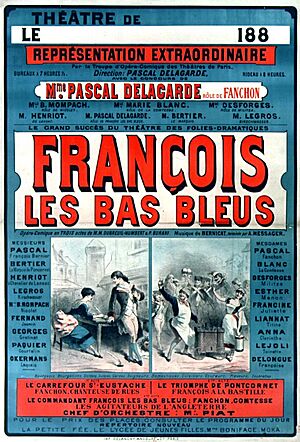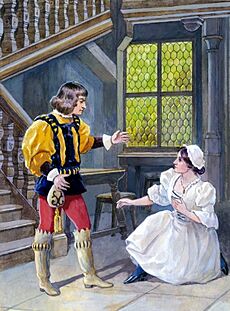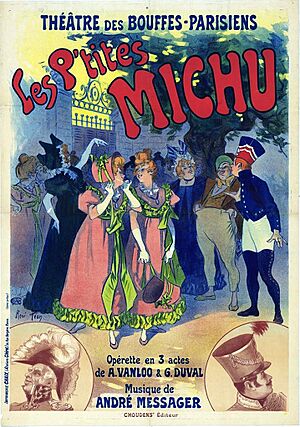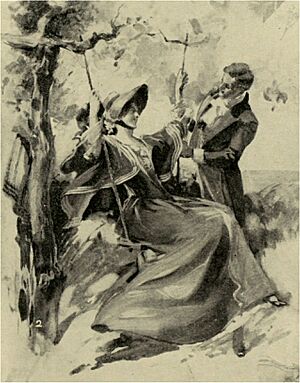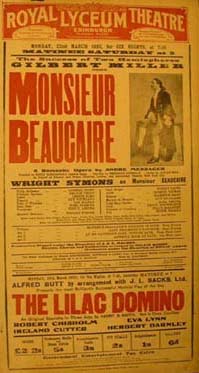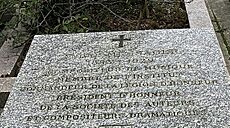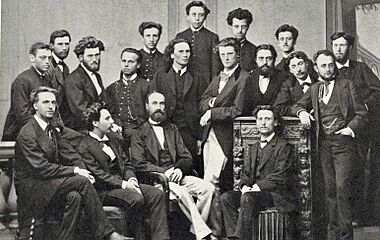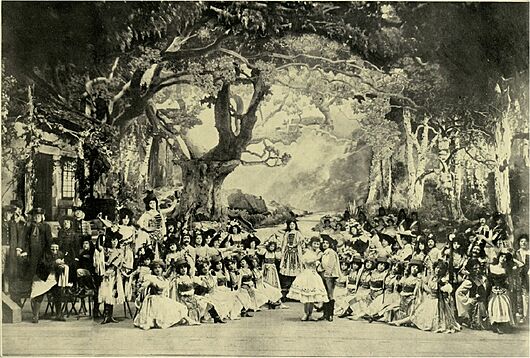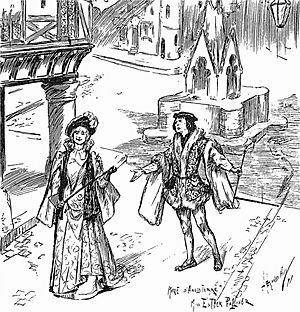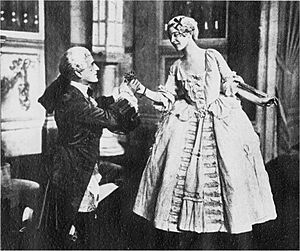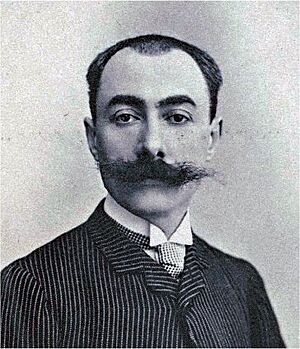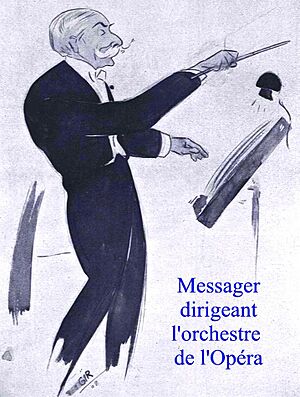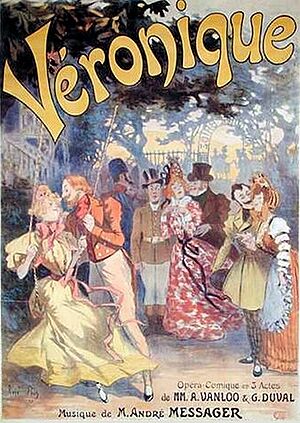André Messager facts for kids
André Charles Prosper Messager (born December 30, 1853 – died February 24, 1929) was a famous French composer, organist, pianist, and conductor. He wrote many pieces, including eight ballets and thirty comic operas (called opéras comiques), operettas, and other stage shows.
Some of his most famous works are the ballet Les Deux Pigeons (1886) and the comic opera Véronique (1898). His shows Les p'tites Michu (1897) and Monsieur Beaucaire (1919) were also very popular around the world.
Messager started playing the piano when he was very young. He later studied music with well-known composers like Camille Saint-Saëns and Gabriel Fauré. He became a very important person in the music world of Paris and later London, both for his compositions and his conducting. Many of his Parisian shows were also performed in London and New York. His most successful works ran for a long time and were brought back to the stage many times. He even wrote two operas in English. Later in his career, he wrote musical comedies for famous actors like Sacha Guitry and Yvonne Printemps.
As a conductor, Messager held important jobs in Paris and London. He led the Opéra-Comique, the Paris Opera, the Orchestre de la Société des Concerts du Conservatoire, and the Royal Opera House in London. Even though he is mostly known for his lighter music as a composer, he conducted many different types of operas, from Mozart to Richard Strauss. He was also known for conducting the works of Richard Wagner. In Paris, he conducted the very first performances of Debussy's Pelléas et Mélisande, Massenet's Grisélidis, and Charpentier's Louise. In London, he conducted the first British performances of operas by Saint-Saëns and Massenet.
Messager's music is known for its beautiful melodies, clever use of instruments, and a special French elegance and grace. Even though most of his works are not performed very often today, music historians see him as the last major figure in French comic opera and operetta.
Life and career
Early years
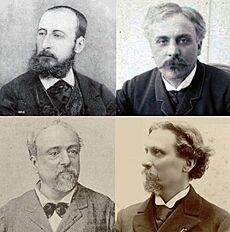
André Messager was born in Montluçon, France, on December 30, 1853. His father was a tax collector. André remembered, "You would not find any musicians among my ancestors." He started learning piano when he was very young. His father did not want him to become a composer at first.
When he was seven, he went to a Marist school where he continued playing the piano. Later, his family lost a lot of money. They then agreed that music could be a good career, especially as a church organist. He received a scholarship to study at the École Niedermeyer de Paris in Paris. This school was known for church music.
During his studies, Messager learned piano, organ, and composition. His teachers included Eugène Gigout, Gabriel Fauré, and Camille Saint-Saëns. One music expert, Jean-Michel Nectoux, said that Messager became one of the best at arranging music for orchestras during that time.
Fauré and Messager became close friends. In 1874, Messager took over from Fauré as the choir organist at Saint-Sulpice church in Paris. In 1876, he won a gold medal for a symphony. This work was well-received when it was performed in 1878. He also won prizes for his cantatas Don Juan et Haydée and Prométhée enchaîné.
In 1879, Fauré and Messager traveled to Germany to see operas by Richard Wagner. They often played a funny piano piece together called Souvenirs de Bayreuth, which made fun of Wagner's music. They also worked together on a more serious piece, their Messe des pêcheurs de Villerville (1881).
First successes
In 1878, Messager became a conductor at the Folies Bergère theater. He started composing for the stage with two short ballets. In 1883, another composer named Firmin Bernicat died, leaving an unfinished operetta called François les bas-bleus. Messager was asked to finish it. He wrote many parts of it and arranged the whole work for orchestra. It was a big success when it opened in November 1883. It was later performed in London and New York.
In 1883, Messager met Edith Clouette and they got married. Fauré played the organ at their wedding. They had one child, Jean André Emile Charles.
Messager and Emmanuel Chabrier were close friends. They performed Chabrier's Trois valses romantiques together in 1883. Messager also arranged a piano version of Chabrier's España. Messager admired Chabrier's serious opera, Gwendoline, and later conducted it in Paris.
After the success of François les bas-bleus, Messager was asked to compose a ballet for the Paris Opéra and an operetta for another theater. The operetta, La Fauvette du temple (1885), was very popular. He sold the rights for it to be performed in Britain. The ballet, Les Deux Pigeons, became one of his most famous works. It was first performed in 1886 and was a huge success.
In 1885, Messager's comic opera La Béarnaise also opened. It ran for three months in Paris and was very successful in Britain and New York. The Times newspaper said this show helped Messager become well-known in London.
However, Messager's next few works were not as successful. His more serious opera, Le Bourgeois de Calais (1888), was not liked. A critic called it "boring" and "banal." He then wrote a musical fairy tale, Isoline (1888), which did a little better, and an operetta, Le Mari de la reine (1889), which failed.
Fin de siècle
Messager's luck changed in 1890 with La Basoche. This show was a big success at the Opéra-Comique. A critic called it "an exceptionally pleasing work." An English version was performed in London in 1891, but it only ran for three months. A New York production in 1893 was also not successful.
Messager was known for his elegant style and witty conversations. In the early 1890s, his first wife, Edith, divorced him. She later became ill, and Messager visited her every day. They became close again before she died in 1892, and Messager felt her loss deeply.
In 1892, Messager's conducting career grew when he was asked to conduct Die Walküre in Marseille. As a composer, the early 1890s brought mixed results. Madame Chrysanthème (1893) was a story about a young Japanese woman and a foreign sailor. It was politely received, but not with great excitement.
Mirette (1894) was Messager's first opera written especially for London. It was the only original Savoy opera by a French composer. To help him with the English style, Messager worked with songwriter Dotie Davis, known as Hope Temple. She became his second wife in 1895. The show ran for 41 performances, was changed, and then ran for another 61. Messager did not want it performed in Paris. His next serious opera, Le Chevalier d'Harmental (1896), was not successful. After these disappointments, he and his new wife moved to the English countryside for a while.
From 1897, Messager's career improved. He received a script in the mail for an operetta. He said, "I was attracted by the gaiety of its subject... the work was completed in three months, and performed in the same year... with great success." This was Les P'tites Michu, which was a huge hit. Its English version in London ran for 401 performances.
Soon after, he became the musical director of the Opéra-Comique. He had another big success with Véronique (1898).
In 1898, his only child from his second marriage, Madeleine Hope Andrée, was born. From 1898 to 1904, Messager's work at the Opéra-Comique left him little time to compose. He turned down an offer to work with W. S. Gilbert and wrote only two stage works during this time. However, his fame as a composer grew internationally, with Les P'tites Michu and Véronique being performed in many countries. Véronique was even performed in French in London in 1903. An English version ran for 496 performances. Messager conducted the first nights of both.
Twentieth century
At the Opéra-Comique, Messager conducted the first performances of Massenet's Grisélidis and Charpentier's Louise. He also conducted the first French performances of operas like Hansel and Gretel and Tosca. But his most famous premiere was Debussy's Pelléas et Mélisande (1902). Messager helped Debussy finish the opera and prepare it for the stage. Debussy was very grateful and dedicated the work to Messager. One expert said that Messager's support for Pelléas et Mélisande alone would earn him a place in music history. Debussy believed Messager was the perfect conductor for his work.
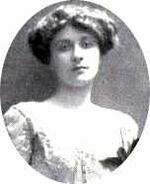
From 1901 to 1907, Messager was one of the directors of the Royal Opera House in London. He spent a lot of time on managing the opera house. He conducted many operas there, including the British premieres of Saint-Saëns's Hélène and Massenet's Le Jongleur de Notre-Dame. In 1906, he also brought his ballet Les Deux Pigeons to London. Even though he was known for conducting Wagner, he let Hans Richter, a top Wagner conductor, lead those performances. In 1906, Messager and the London Symphony Orchestra went to Paris to play English music.
In 1907, Messager started composing again. His comic opera Fortunio was very successful. In the same year, he became a joint director of the Paris Opéra. He wanted to make the Opéra "more genuinely French." He brought back old French operas and also presented foreign operas, including the first complete Ring cycle in Paris. He also conducted the French premiere of Richard Strauss's Salome. Messager left the Opéra in 1913, but returned in 1914 to conduct Parsifal, which was its first performance in Europe outside Bayreuth.
Messager also became the conductor of the Orchestre de la Société des Concerts du Conservatoire in 1908. This was France's most respected symphony orchestra. He wanted it to be as famous as the Vienna and Berlin orchestras. He conducted many classic works and also introduced older French music. During World War I, he took the orchestra on tours to Argentina, Switzerland, and the US and Canada. They were very well received everywhere they went. Messager retired from this job after the tour.
Messager was criticized for performing Wagner's music during the war. But he believed that German music showed the noble side of the enemy country. He refused to join a group that wanted to boycott German music.
In 1914, Messager composed Béatrice, which was not successful. In 1915, he contributed music to King Albert's Book to raise money for people suffering in Belgium during the war.
In 1919, Messager's operetta Monsieur Beaucaire opened in England and had a long run. Messager was ill and could not attend the first performances. The show was also performed in Paris and New York. Later in 1919, Messager returned to be the musical director of the Opéra-Comique for a season.
Last years
In the 1920s, Messager adapted his style to fit new musical trends. He started writing musical comedies, making his music lighter but still keeping its French charm. He worked with Sacha Guitry on musical comedies like L'Amour masqué (1923) and Deburau (1926), starring Yvonne Printemps. L'Amour masqué was a big success in Paris. Fauré, who was old and deaf by then, read the score of L'Amour masqué and wrote to Messager, "Your wit is the same as always – it never grows old." Fauré died the next year, and Messager dedicated the music of Deburau to his memory.
In 1924, Sergei Diaghilev asked Messager to conduct the Paris premieres of ballets by Auric and Poulenc. In 1928, Messager played an important role in updating copyright law, though he lost his specific case against the BBC.
Messager died in Paris on February 24, 1929, at the age of 75, after a short illness. He was buried in the Passy Cemetery near the graves of Debussy and Fauré. His last completed work, the operetta Coups de roulis, was still playing in Paris when he died. A critic at the time said, "Its tuneful melodies show that the veteran composer had lost nothing of the qualities that made Véronique such a success."
Honours and awards
Messager was chosen as President of the Société des Auteurs et Compositeurs Dramatiques in 1926, the first composer to hold this position. In the same year, he was elected to the Académie des Beaux-Arts, a famous French arts academy. In 1927, he received the Commander of the Légion d'honneur, a high French award.
In his hometown of Montluçon, a music academy opened in 2009 is named after him. In 2003, for his 150th birthday, there was a big exhibition about Messager at the Musée des musiques populaires in Montluçon.
Music
Music expert John Wagstaff wrote in 1991 that Messager's music is known for its excellent orchestration (how instruments are used), smooth melodies, and well-written, dance-like qualities. Messager loved arranging music for orchestras. He said that musical ideas came to him "already clothed in the appropriate instrumental shades." He found it relaxing to work on "the handling of instruments, the balancing of different sounds, the grouping of colors and the structuring of effects."
Gervase Hughes, who studied French operetta, said that Messager's only small flaw was repeating rhythms too much. However, Messager's natural artistry made this a minor point. One of his special traits was his love for chromaticism (using notes outside the main scale). This appealed to younger composers. Even though Messager admired Wagner and conducted his music, he kept his own compositions separate from Wagner's style.
Unlike some older composers, Messager was open to new ideas throughout his life. His style changed with the times. His student Henry Février said that Messager's later works, like Les P'tites Michu and Véronique, brought a "fresher approach" to the comic opera style. Towards the end of his career, Messager successfully moved into "comédie musicale," which is the French version of musical comedy.
Messager composed thirty works for the stage, not including ballets. These works fit into different types, like comic operas, operettas, and musical comedies. He once said that he never meant to write what people called "operetta," because that word often had a negative meaning. He always wanted to continue the tradition of French comic opera with spoken dialogue.
Early stage works
Even though Messager called some of his early works comic operas, they were more like operettas. However, Messager added new and daring musical details to his early pieces. He tried to make operettas as artistic as comic operas, while keeping their lively spirit.
Messager's most lasting work is the ballet score Les Deux Pigeons (1886). It is based on a fable by Jean de La Fontaine. The music is best known from a five-part suite taken from the full score. Messager brought the ballet back in 1906 in London and in 1912 in Paris in a shorter version. In 1961, John Lanchbery updated it for Frederick Ashton's new version of the ballet. This version is still performed regularly by the Royal Ballet.
Isoline (1888) was a musical fairy tale. Fauré called it "one of the most poetic, most expressive works that have been written in France in the last twenty years." But it did not become popular. The music was mostly forgotten until 1930. The ballet part of the work has remained in the repertory.
1890s stage works
The 1890s started well for Messager with the success of La Basoche (1890). Henry Février called it "the last of the great nineteenth-century French comic operas." Music expert James Harding said it was "the best Messager had written to date." When it was performed in London, a reviewer called it "A work of great beauty and charm."
With Madame Chrysanthème (1893), a four-act "lyric comedy" without spoken dialogue, Messager reached a turning point. The story was similar to Puccini's later opera Madama Butterfly: a young Japanese woman is loved and then left by a foreign sailor. Critics praised Messager's sensitive handling of the story. However, Messager felt he had gone too far towards serious opera and away from his usual style. After this, Messager made his style simpler, reducing the complex musical details of his earlier works.
His works in the middle of the decade were not very successful. Le Chevalier d'Harmental (1896) was a failure. After these disappointments, Messager ended the 1890s with two big successes. Les P'tites Michu (1897) was a "sensational hit." Its story about babies switched at birth was not new, but Messager's music made it special.
The last work from the decade was Véronique. Messager called it a comic opera, but it is seen as a mix of operetta and comic opera. The score includes two of his most famous songs, the "Swing duet" and the "Donkey duet." It became and has remained his most performed musical theater piece.
20th century
Messager's work running opera houses limited his composing between Véronique and after World War I. Fortunio (1907) was a rare example of an opera where all the words are sung, with no spoken dialogue.
Among his post-war stage works, Monsieur Beaucaire, a "romantic operetta" (1919), was his second work with an English script. French critics thought it was too sweet and sentimental for English tastes. However, the show ran well in Britain, the US, and even in France.
Of Messager's 1920s musical comedies, L'Amour masqué (1923) is the best known. The theater where it premiered had a small orchestra pit, so Messager created a new way of arranging music for a small number of musicians. The piece even included a tango, which was very modern for the time.
Non-stage works and role in French music
Messager wrote songs for solo voice with piano throughout his career. He liked the poems of Armand Sylvestre and set many of them to music. He also set poems by famous writers like Victor Hugo.
Messager said he would have liked to write more concert works, but never had the chance. His Symphony in A, written when he was 22, is a classical symphony with four movements. It shows his skill in using instruments and has a French feel, especially in the wind parts.
When Messager was elected to the Académie des Beaux-Arts in 1926, a music magazine noted that this gave his chosen style – operetta – official recognition. However, his fame as a composer of light music has sometimes overshadowed his important standing in serious music circles. Leading composers valued his friendship and advice. Fauré called him "familiar with everything, knowing it all, fascinated by anything new." Messager also wrote music reviews for newspapers.
One expert said that Messager combined "a flow of spontaneous melody worthy of Offenbach with a flair for economic workmanship at least the equal of Lecocq's." He also had "Massenet's fluent grace, Saint-Saëns's aristocratic elegance, even Fauré's refined subtlety." Messager lived through a whole era of music, from when older composers like Auber and Rossini were alive to after World War I.
Conductor
Messager was admired as a conductor. He did not make big, showy movements on the stage. His movements were precise and clear, meaning a lot to the orchestra. Music critic Pierre Lalo wrote that under Messager's direction, Parsifal, a very grand opera, "assumed a French clarity, and a sobriety, nobility and order." Another conductor, Reynaldo Hahn, said that Messager was "the most French of conductors" because of his sharpness, grace, and clarity.
Recordings
In 1918, Messager conducted recordings in New York with the Orchestre de la Société des Concerts du Conservatoire. They recorded pieces by composers like Delibes, Charpentier, Saint-Saëns, and Rimsky-Korsakov. Many of Messager's own works have also been recorded.
Complete operas
Several of Messager's stage works have been recorded in full. There are three complete recordings of Véronique. Other complete recordings include L'Amour masqué, La Basoche, Coups de roulis, Fortunio, Isoline, Monsieur Beaucaire, Passionnément, and Les p'tites Michu.
Individual numbers
Many singers have recorded individual songs from Messager's works. These include the original performers of roles and other famous singers from his time, as well as more recent artists like Mady Mesplé, Susan Graham, and Felicity Lott.
Non-operatic recordings
Messager's Messe des pêcheurs de Villerville, which he wrote with Fauré, has been recorded. Their funny Wagner piece, Souvenirs de Bayreuth, has also been recorded by piano players and in an orchestral version. A suite from Les Deux Pigeons has been recorded many times. His ballet-pantomime Scaramouche and his Symphony in A have also been recorded. His Solo de concours, a piece for clarinet and piano, has been recorded many times.
List of works
Stage works (except ballets)
| Title | Genre | Year | Acts | Librettists | Notes |
|---|---|---|---|---|---|
| Les Païens The Pagans |
operetta | 1876 | ? | Henri Meilhac | |
| François les bas-bleus François the Bluestocking |
comic opera | 1883 | 3 | Ernest Dubreuil, Eugène Humbert and Paul Burani | |
| Gisèle | operetta | c. 1884–5 | 3 | F. Oswald and Maxime Boucheron | |
| La Fauvette du temple The Temple Songbird |
comic opera | 1885 | 3 | Eugène Humbert and Paul Burani | |
| La Béarnaise The Woman from Béarn |
comic opera | 1885 | 3 | Eugène Leterrier and Albert Vanloo | |
| Le Petit Poucet Tom Thumb |
fairy show | 1885 | 4 | Eugène Leterrier, Albert Vanloo and Arnold Mortier | |
| Le Bourgeois de Calais The Burgher of Calais |
comic opera | 1887 | 3 | Ernest Dubreuil and Paul Burani | |
| Les premières armes de Louis XV The First Conquest of Louis XV |
comic opera | 1888 | 3 | Albert Carré | |
| Isoline | fairy tale | 1888 | 3 | Catulle Mendès | |
| Le Mari de la reine The Queen's Husband |
operetta | 1889 | 3 | Ernest Grenet-Dancourt and Octave Pradels | |
| La Basoche The Guild |
comic opera | 1890 | 3 | Albert Carré | |
| Hélène | lyric drama | 1891 | 4 | Paul Delair | |
| Madame Chrysanthème Madam Chrysanthemum |
lyric comedy | 1893 | 4 | Georges Hartmann and Alexandre André | |
| Miss Dollar | operetta | 1893 | 3 | Charles Clairville and Albert Vallin | |
| Mirette | comic opera | 1894 | 3 | Michel Carré, Frederic Weatherly, Percy Greenbank and Adrian Ross | |
| Le Chevalier d'Harmental The Knight of Harmental |
comic opera | 1896 | 5 | Paul Ferrier | |
| La Fiancée en loterie The Raffled Bride |
operetta | 1896 | 3 | Camille de Roddaz and Alfred Douane | |
| La Montagne enchantée The Enchanted Mountain |
fantasy play | 1897 | 5 | Albert Carré and Émile Moreau | |
| Les P'tites Michu The Little Michus |
operetta | 1897 | 3 | Georges Duval and Albert Vanloo | |
| Véronique | comic opera | 1898 | 3 | Georges Duval and Albert Vanloo | |
| Les Dragons de l'impératrice The Empress's Dragoons |
comic opera | 1905 | 3 | Georges Duval and Albert Vanloo | |
| Fortunio | lyric comedy | 1907 | 5 | Gaston Arman de Caillavet and Robert de Flers | |
| Béatrice | lyric legend | 1914 | 4 | Gaston Arman de Caillavet and Robert de Flers | |
| Cyprien, ôte ta main de là! Hands off, Cyprien! |
fantasy | 1916 | 1 | Maurice Hennequin | |
| Monsieur Beaucaire | romantic operetta | 1919 | 3 | Frederick Lonsdale and Adrian Ross | |
| La Petite Fonctionnaire The Post-Mistress |
musical comedy | 1921 | 3 | Alfred Capus and Xavier Roux | |
| L'Amour masqué Hidden Love |
musical comedy | 1923 | 3 | Sacha Guitry | |
| Passionnément Passionately |
musical comedy | 1926 | 3 | Maurice Hennequin and Albert Willemetz | |
| Deburau | stage music | 1926 | 4 | Sacha Guitry | |
| Coups de roulis The Roll of the Ship |
operetta | 1928 | 3 | Albert Willemetz and Maurice Larrouy |
Ballets(All are one act, unless stated otherwise)
Orchestral music
Chamber and instrumental music
Choral music |
SongsFor solo voice with orchestral accompaniment
For solo voice with piano accompaniment
|
Images for kids
See also
 In Spanish: André Messager para niños
In Spanish: André Messager para niños


